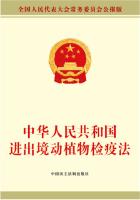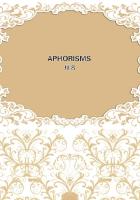what does such a reduction of the godhead imply?--To be sure, the "kingdom of God" has thus grown larger. Formerly he had only his own people, his "chosen" people. But since then he has gone wandering, like his people themselves, into foreign parts; he has given up settling down quietly anywhere;finally he has come to feel at home everywhere, and is the great cosmopolitan--until now he has the "great majority" on his side, and half the earth. But this god of the "great majority," this democrat among gods, has not become a proud heathen god: on the contrary, he remains a Jew, he remains a god in a corner, a god of all the dark nooks and crevices, of all the noisesome quarters of the world! . . His earthly kingdom, now as always, is a kingdom of the underworld, a souterrain kingdom, a ghetto kingdom. . . And he himself is so pale, so weak, so decadent . . . Even the palest of the pale are able to master him--messieurs the metaphysicians, those albinos of the intellect. They spun their webs around him for so long that finally he was hypnotized, and began to spin himself, and became another metaphysician. Thereafter he resumed once more his old business of spinning the world out of his inmost being sub specie Spinozae; thereafter he be came ever thinner and paler--became the "ideal," became "pure spirit,"became "the absolute," became "the thing-in-itself." . . . The collapse of a god: he became a "thing-in-itself." 18. The Christian concept of a god--the god as the patron of the sick, the god as a spinner of cobwebs, the god as a spirit--is one of the most corrupt concepts that has ever been set up in the world: it probably touches low-water mark in the ebbing evolution of the god-type. God degenerated into the contradiction of life. Instead of being its transfiguration and eternal Yea! In him war is declared on life, on nature, on the will to live! God becomes the formula for every slander upon the "here and now,"and for every lie about the "beyond"! In him nothingness is deified, and the will to nothingness is made holy! . . . 19. The fact that the strong races of northern Europe did not repudiate this Christian god does little credit to their gift for religion--and not much more to their taste. They ought to have been able to make an end of such a moribund and worn-out product of the decadence. A curse lies upon them because they were not equal to it; they made illness, decrepitude and contradiction a part of their instincts--and since then they have not managed to create any more gods. Two thousand years have come and gone--and not a single new god! Instead, there still exists, and as if by some intrinsic right,--as if he were the ultimatum and maximum of the power to create gods, of the creator spiritus in mankind--this pitiful god of Christian monotono-theism! This hybrid image of decay, conjured up out of emptiness, contradiction and vain imagining, in which all the instincts of decadence, all the cowardices and wearinesses of the soul find their sanction!-- 20. In my condemnation of Christianity I surely hope I do no injustice to a related religion with an even larger number of believers: I allude to Buddhism. Both are to be reckoned among the nihilistic religions--they are both decadence religions--but they are separated from each other in a very remarkable way. For the fact that he is able to compare them at all the critic of Christianity is indebted to the scholars of India.--Buddhism is a hundred times as realistic as Christianity--it is part of its living heritage that it is able to face problems objectively and coolly; it is the product of long centuries of philosophical speculation. The concept, "god," was already disposed of before it appeared. Buddhism is the only genuinely positive religion to be encountered in history, and this applies even to its epistemology (which is a strict phenomenalism) --It does not speak of a "struggle with sin," but, yielding to reality, of the "struggle with suffering." Sharply differentiating itself from Christianity, it puts the self-deception that lies in moral concepts be hind it; it is, in my phrase, beyond good and evil.--The two physiological facts upon which it grounds itself and upon which it bestows its chief attention are: first, an excessive sensitiveness to sensation, which manifests itself as a refined susceptibility to pain, and secondly, an extraordinary spirituality, a too protracted concern with concepts and logical procedures, under the influence of which the instinct of personality has yielded to a notion of the "impersonal." (--Both of these states will be familiar to a few of my readers, the objectivists, by experience, as they are to me). These physiological states produced a depression, and Buddha tried to combat it by hygienic measures. Against it he prescribed a life in the open, a life of travel; moderation in eating and a careful selection of foods; caution in the use of intoxicants; the same caution in arousing any of the passions that foster a bilious habit and heat the blood; finally, no worry, either on one's own account or on account of others. He encourages ideas that make for either quiet contentment or good cheer--he finds means to combat ideas of other sorts. He understands good, the state of goodness, as something which promotes health. Prayer is not included, and neither is asceticism. There is no categorical imperative nor any disciplines, even within the walls of a monastery (--it is always possible to leave--). These things would have been simply means of increasing the excessive sensitiveness above mentioned. For the same reason he does not advocate any conflict with unbelievers; his teaching is antagonistic to nothing so much as to revenge, aversion, ressentiment (--"enmity never brings an end to enmity": the moving refrain of all Buddhism. . .)And in all this he was right, for it is precisely these passions which, in view of his main regiminal purpose, are unhealthful. The mental fatigue that he observes, already plainly displayed in too much "objectivity"(that is, in the individual's loss of interest in himself, in loss of balance and of "egoism"), he combats by strong efforts to lead even the spiritual interests back to the ego. In Buddha's teaching egoism is a duty.
同类推荐
热门推荐
倾城笑逆天毒女很狂傲
新文开坑!!!她很毒,五岁的她将南宫月凌推进了荷花池里,却开心的笑。她很坏,带着她的师兄师弟去闯祸,害师兄师弟被骂。她很调皮,抓蛇把十二皇子吓哭。看她这毒女如何逆天,嗜魂教教主:“丫头你怎么站这么远?”纤儿“教主你太妖了,身为普通人的我不敢靠近!”五皇子:“纤儿休逃!你是本皇子的宠妃!”纤儿:“臣妾做不到!”狐狸美人:“主人,等我修炼成人,你一定要将我娶回家”纤儿:“我没那么重口味!”……请看正文!TFBOYS之薄荷般爱恋
那一年,世界变迁,他们也分开了。曾经说好一起看海,可是他人呢?轻轻的吉他声响起……“王俊凯,你终于回来了……”“嗯…我回来了,不会在丢下你了。”薄荷色的青涩爱恋,他们都是彼此的唯一。“果然我的琳丫头最美了。”弹着钢琴的少年宠溺的看着身边的女孩,眼神里的深情深不见底。“嗯…王源,我有没有告诉过你,你弹钢琴很好听。”“有。”“那我有没有告诉你,弹钢琴的你很温柔,很美好……”梨涡浅浅,笑容淡淡,他们分开1年,终于他忍不住了。“昔晴,如果我和他一起掉进河里,你会就谁?”“我救我最爱的人。”女孩淡淡开口。“呵,我知道了。”少年说完转身离去。“易烊千玺!我最爱的人是你啊!一直都是你……”他的身体僵硬……中华人民共和国进出境动植物检疫法
为加强法制宣传,迅速普及法律知识,服务于我国民主法制建设,多年来,中国民主法制出版社根据全国人大常委会每年定期审议通过、修订的法律,全品种、大规模的出版了全国人民代表大会常务委员会公报版的系列法律单行本。该套法律单行本经过最高立法机关即全国人民代表大会常务委员会的权威审定,法条内容准确无误,文本格式规范合理,多年来受到了社会各界广泛关注与好评。















